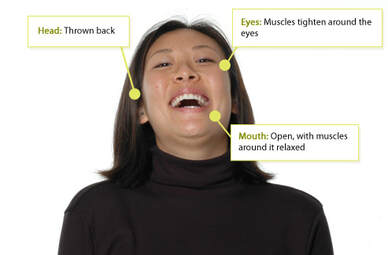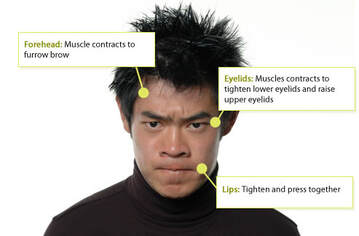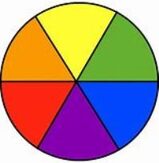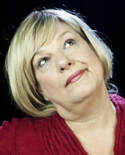
No! You really don’t!
You can speculate what someone else is feeling and thinking based on facial expression, body language, how well you know the other person, and the circumstances, and you may be right, but you can’t know for sure without taking up residence inside his mind.
You can’t be absolutely sure even if the person tells you. And look, how many times in our lives do we have mixed emotions or confusion… times when we, ourselves in our own minds, don’t know what we’re thinking or how we feel?
Don’t get me wrong. People can and do read body language, including facial expressions. In fact, we are pretty good at it. Most researchers and scientists contend that nearly 60% of human communication is non-verbal.
Facial expressions
The human face is extremely expressive, able to convey countless emotions without saying a word. And unlike some forms of nonverbal communication, facial expressions are universal. The facial expressions for happiness, sadness, anger, surprise, fear, and disgust (the basics) are the same across cultures. Therefore, there is a close tie between reading facial expressions and surmising how someone is feeling.
THE CHALLENGE FOR WRITERS
Writers, in particular fiction writers, face the challenge of conveying to their readers how different characters in the story are reacting to and feeling about what is happening to them and those around them. That is how readers engage with the characters, but all writers have to work with are words on the page.
The easiest, lazy way to convey reaction and feelings is to have an omniscient narrator tell the reader, “Jane felt sad.” “Jack looked terrified.” It is also the least interesting and least engaging way to inform the reader. Show, don’t tell.
Another technique is internal dialogue where the reader “hears”, so to speak, what the view point character is thinking and feeling. But this only lets the reader into the VP character’s mind. How is everyone else involved reacting and feeling?
The reader can see what the VP characters see about others through facial expressions and body language or, better still, the writer can show the emotions without filtering them through someone else’s view point.
EMOTIONS
How Many Are There?
Once upon a time not so long ago, psychologists believed there were six basic emotions common to all human beings: happiness, sadness, anger, surprise, fear, and disgust. From there, the field came up with 7, 8, and then 12 discrete emotions. Charles Darwin’s theory was 34.
Since then, humans haven’t changed, but the latest study conducted by the University of California, Berkeley, involving thousands of individuals, suggests there are 27 distinct emotions, all intimately connected one with the other.
No man, or emotion, is an island. If you want to delve into the theories, go to MedicineNet: medicinenet.com/what_are_the_27_basic_emotions/article.htm
For Writing Purposes
We all know intuitively that human emotions come in various gradations. They are related but different extremes which are often identified by different names or words. I see them like a color wheel.
INDEX OF EMOTIONS COVERED IN THESAURUS
| Amusement / Laughter / Joy Anger Annoyance Anticipation Boredom Confidence / Pride Confusion Contentment Contempt Compassion Curiosity Defensiveness Desire Desperation Disappointment Disgust Disinterest Distrust | Doubt Elation Energetic / Enthusiastic Embarrassment Exhaustion / Fatigued Fear Frustration Guilt Happiness Hate Haughtiness / Smugness Hopefulness Humiliation Hurt Interest Impatient Indignant Jealousy | Loneliness Love / Attraction / Flirtation Lying Pain Relief Reluctance Resignation Sadness / Grief Satisfaction Sarcasm / Verbal Disrespect Shy Somber Stubborn Sullen Surprise / Shock Suspicious / Wary / Uncomvinced Sympathyc Threatening Worried / Ill at Ease |
Whether you are an author writing a novel or just a person experiencing life, the “when, where, why, how, and with whom must be looked at together.
● Everyone is different and each person may react and feel differently than others, sometime in unexpected ways.
● One facial expression or body motion can mean many things. A person is capable of sending a variety of messages or clues with a smile or a frown. Reading this text, you’ll recognize the same interpretation of an expression may be used often to mean different emotions.
● In the same type of situation and even in the same situation at the same time as others, participants can hear, see, feel, taste, and smell different things in spite of what the reality is. Our brains assimilate stimuli in different ways and then interpret and remember them in relation to each individuals’ filters. In reality the witnesses to an accident between a black car and a blue car will see one of the cars speeding away from the scene, but they will remember it as different colors.
Take all things into account when describing a scene so that the facial expression, body language, and context all match the situation and reactions that you, as the writer, intend it to mean. Never assume readers will know what you mean. They don't know what the author is thinking.
Facial Expression Image Source: entusiastiq.blogspot.com/facial-expressions

● Backward head movement
● Genuine laughter
● Open mouth, usually with wide smile
or grin
● Muscles contract around the eyes, making crow’s feet
| ●Gasping for breath; wheezing ● Eyes tearing, wiping at eyes ● A high voice, Whimpers of mirth ● Pain in the ribs or stomach ● Shaking with hysteria ● Light-headedness ● Holding onto ones sides ● Slapping knees; Slapping someone on the back, punching in the arm, bumping shoulders or drumming feet on floor ●·Collapsing into a chair ● Quirked eyebrow / raised eyebrows ● Falling against someone for support ●“Drunken” behavior; weaving, reaching for support, struggling to stay upright ● Repeating the punch line over and over ● Face reddening, shaking head, trying to regain control ● Spewing food or drink if eating/drinking ● Falling to the ground, rolling on the floor | ● Asking/begging people to stop making you laugh; Holding you hand up as you laugh as if to ward off more jokes ● Grabbing at ribs / a stitch in your side ● Weakness in knees, muscles twitching ● Trying to keep a straight face but failing ●Covering mouth with a hand to hide a smile; hold in laugh ● Cupping cheeks with hands ● Avoiding eye contact to maintain control over laughter ●Clearing throat, struggling to speak in full sentences ● Attempting to change the topic/discussion to avoid falling apart with laughter ●Making gestures in lieu of speaking be-cause you’re unable to form words correctly ● Biting down on lip, pressing lips together to keep from laughing |
Image Source: entusiastiq.blogspot.com/facial-expressions

Muscle movements in the lips, around the eyes and in the brow mean feelings of aggression, threat, or frustration. The face tenses up possibly in preparation to protect the face in physical confrontation; e.g. a furrowed brow might protect the eyes. An angry person usually expresses bitter-ness about life in general.
| Other Physical Behavior ●Clenching/ unclenching fists, nails biting into palms ● Pounding fists against thighs, table, wall ● Slamming doors, cupboards, drawers ● Stomping, stamping ● Body tense, Rigid posture ● Quivering muscles ● Breathing deeply, noisily ● pulse/heartbeat slowing or speeding ● Vein visibly pulsing in various body parts | Other Physical Behavior ● Smiles that don't reach the eyes ● Laughter with an edge ● Yelling or snapping at people ● Using a carefully controlled tone ● Voice shaking ● Sarcasm ● Picking fights (verbal or physical) ● Irrational reactions to inconsequentials ● Demanding immediate action ● Taking inappropriate risks |
ANNOYANCE
While the emotion “annoyance” is sometimes used as a synonym of angry, as an adjective there's a difference between being annoyed and being angry. "Annoyed" means troubled or irritated by something unwanted or unliked; vexed.
| ● Mouth turned down ● Mouth fine line or quirked ● Eyes squinted or narrowed ● Rolling eyes or glazed glassy stare ● Wrinkled nose ● A frown or grimace ● Avoiding looking at person, eyes turned away ● Clenched jaw |
|
Anticipation is the energy or driving force behind any action. Isaac Newton said it best, stating that “every object will remain at rest or in motion unless compelled by an external force.” This Law of Inertia applies to everything in nature… include humans. Activity in the brain called neural clairvoyance created strong activity; in the area of the brain responsible for preparing the body to move. February 25 issue /Journal of Neuroscience
The greater the anticipation, the greater the reaction. For the purposes of this article, anticipation is related to something good or pleasant. It could be dread of something terrible.
| Facial Expression ● Biting lip, licking lips ● Wide smile ● Open mouth and wide eyes similar to surprise ● Closing eyes (with smile), staring off into space; dreamy ● Bright animated eyes Other Physical Behavior ● Sweaty palms ● Fluttery, empty feeling in stomach ● Breathlessness ● Trembling hands ● Crossing/ uncrossing legs ● Frantic planning for the event ● Can’t think/talk about anything else ● Fear something will happen to screw things up ● Loss of sleep ● Lack of concentration | Other Physical Behavior ● Day-dreaming; fantasizing/building up event far beyond its reality ● An inability to sit still, fidgeting ● Bouncing on toes, springy steep ● Twisting hands together, fussing with clothes, rearranging things ● Waiting at a window, hovering at the door or by the phone ● Checking/rechecking hair, make up ● Gossiping with others, sharing excitement ● Drumming feet against the floor ● Covering face, then peeking ● Closing eyes and sighing ● Pacing ● Obsessive clock-watching ● Checking and rechecking email, text messages ● Leaning in toward others with interest ● Tingling all over ● Picking at food, too excited to eat |
Boredom is defined as “the state of being weary and restless through lack of interest.” And most of us know what it’s like to have a lack of interest in certain settings.
People need to learn that, first, we can tolerate it, and second, some really good things can emerge from those moments of downtime. Now, as our world becomes a place of rapid hyper-stimulation, our tolerance for living through boredom is becoming nonexistent.
| Facial Expression ● Head tilted, often supported by hand(s), ● Half-open eyelids along with raised eyebrows ● Lowered eyes staring at nothing ● Turned down mouth ● Slouching posture ● Eyes unfocused or glazed looking | Other Physical Behavior ● Slumping shoulders; Slouching ● Hands in lap or holding up head; prop chin ● General fidgeting ● Repetitive motion like swinging one foot or rubbing the chin ● Yawning |
Complete Sources:
https://www.psychmechanics.com/facial-expressions-disgust/
http://entusiastiq.blogspot.com/2014/03/facial-expressions.html
https://www.businessinsider.com/how-to-tell-someones-lying-by-watching-their-face-2016-1#take-note-of-what-youre-asking-them-5
http://www.nlp-secrets.com/how-to-tell-if-someone-is-lying.php
http://www.cccoe.net/social/bodylang.htm
http:/thedreamwithinpictures.com/blog/portrait-analysis-reveals-that-the-human-face-can-express-at-least-21-emotions
https://imotions.com/biosensor/fea-facial-expression-analysis/?creative=377770993338&keyword=facial%20expression%20analysis&matchtype=b&network=s&device=c&gclid=EAIaIQobChMImOfH2Zms8QIVi7bICh3HxQGPEAAYAiAAEgLDUvD_BwE
https://devblogs.microsoft.com/cse/2015/11/29/emotion-detection-and-recognition-from-text-using-deep-learning/#:~:text=Sentiment%20Analysis%20aims%20to%20detect%20positive%2C%20neutral%2C%20or,such%20as%3A%20Gauging%20how%20happy%20our%20citizens%20are.
https://allwritealright.com/how-to-describe-facial-expressions-in-writing/
https://kathysteinemann.com/Musings/expressions/
https://www.macmillandictionary.com/thesaurus-category/british/words-used-to-describe-facial-expressions
https://www.nownovel.com/blog/talking-character-face/
https://thoughtcatalog.com/january-nelson/2018/06/list-of-emotions/
USE THIS▲
https://pubmed.ncbi.nlm.nih.gov/24724522/
https://www.schoolofmotion.com/blog/understanding-the-principles-of-anticipation
https://ricepsychology.com/rice-psychology-team/dr-wendy-rice/being-bored-why-its-a-good-thing-for-your-kids/
https://www.psychologytoday.com/us/blog/annals-the-emotions/201508/what-do-you-look-when-you-re-bored
https://www.differencebetween.com/difference-between-pride-and-vs-confidence/#:~:text=%20What%20is%20the%20difference%20between%20Prid
https://listverse.com/2013/07/05/ten-compelling-origins-of-our-facial-expressions/#:~:text=10%20Common%20Facial%20Expressions%20Explained%201%20Confusion.%20An,Fear.%20...%209%20Sadness.%20...%2010%20Happiness.%20
https://thoughtcatalog.com/january-nelson/2018/06/list-of-emotions/#:~:text=Facial%20Expression%2FEmotion%3A%20Happy%20Happiness%20is%20an%20emotion%20that,studied%20throughout%20different%20philosophical%2C%20religious%2C%20and%20biological%20approaches.
https://thetrustambassador.com/2020/04/27/body-language-76-contempt/#:~:text=The%20most%20obvious%20body%20language%20associated%20with%20superiority,by%20looking%20down%20one%E2%80%99s%20nose%20at%20another%20person.
https://www.mindful.org/what-compassion-looks-like/#:~:text=%20This%20means%20literally%20tuning%20in%20to%20the,%E2%80%9CApproach%E2%80%9D%20signals%2C%20such%20as%20learning%20toward...%20More
https://www.ionos.com/startupguide/productivity/body-language/#:~:text=Facial%20expression%201%20Interest%2Fcuriosity%3A%20Your%20eyes%20are%20wide,wide%20and%20eyebrows%20are%20raised.
https://writershelpingwriters.net/2008/06/emotion-thesaurus-entry-curiosity/
https://www.presentationprep.com/body-language-face/#:~:text=During%20a%20presentation%2C%20your%20face%20conveys%20more%20to,also%20communicate%20fear%2C%20frustration%2C%20or%20lack%20of%20control.
https://www.verywellmind.com/understand-body-language-and-facial-expressions-4147228
http://rainydaywriting.co.uk/portraying-the-emotion-of-desperation/#:~:text=%20Expressing%20the%20emotion%20of%20desperation%20%201,Needing%20or%20wanting%20something%20very%20much%20More%20
https://accuratebodylanguage.wordpress.com/tag/disgust/#:~:text=DISGUST%20usually%20involves%20the%20sense%20of%20smell%2C%20taste%2C,indicating%20disgust%3A%20Forehead%3A%20usually%20relaxed.%20Eyebrows%20are%20lowered.
https://greatergood.berkeley.edu/article/item/how_many_different_human_emotions_are_there#:~:text=Psychology%20once%20assumed%20that%20most%20human%20emotions%20fall,emotions%E2%80%94and%20they%20are%20intimately%20connected%20with%20each%20other.
http://thebookshelfmuse.blogspot.com/
https://greatergood.berkeley.edu/article/item/are_emotions_born_or_made
https://www.medicinenet.com/what_are_the_27_basic_emotions/article.htm#:~:text=The%2027%20different%20emotions%20include%3A%201%20Admiration%202,Boredom%209%20Calmness%2010%20Confusion%20More%20items...%20
https://online.uwa.edu/news/emotional-psychology/#:~:text=Emotions%20and%20Psychology%201%20Basic%20and%20Complex%20Emotions.,Schachter-Singer%20Theory.%20...%208%20Cognitive%20Appraisal%20Theory.%2
https://www.psychologytoday.com/us/blog/between-cultures/201911/understanding-hate
https://www.scienceofpeople.com/microexpressions/
https://www.psychologytoday.com/us/blog/fulfillment-any-age/201407/the-one-emotion-really-hurts-your-brain






















 RSS Feed
RSS Feed